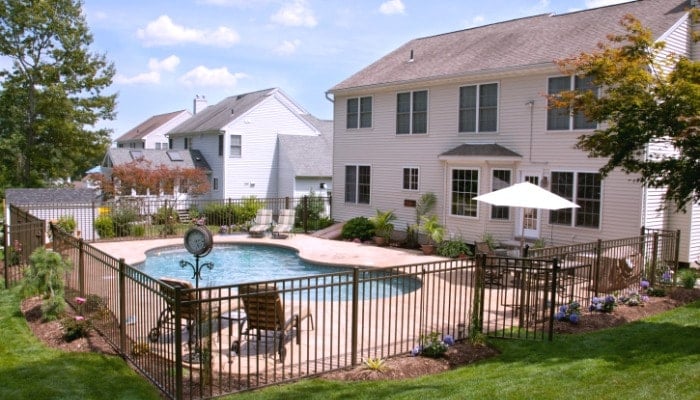For some tenants, renting a property with a pool can be the ultimate rental property amenity. They might envision themselves hosting neighborhood barbecues near the water, spending an afternoon relaxing on a raft in the pool, or helping their kids learn how to swim. Plus, a swimming pool adds value to the property overall, which in turn means higher rent.
However, it is important for landlords to fully understand the risks of renting a property with a pool. To do so, landlords must comply with several laws and take extra precautions to protect themselves. Read on to discover everything you need to know about pools and rental properties below.
What Landlords Need to Know Before Renting a Property with a Pool
For landlords, pools are not all fun and games. Unfortunately, a pool at your rental property adds to the risk of being sued or landing in financial trouble. That said, take a look at these important considerations below –
- Increased Property Owner Liability
- Plan for Added Insurance Requirements
- Follow Maryland Fence Laws
- Include a Lease Addendum
 Increased Property Owner Liability
Increased Property Owner Liability
Whether you live in Baltimore County or Anne Arundel County, or a different part of Maryland, you’ve undoubtedly heard stories of people, especially children, being injured or drowning due to swimming pools. According to the CDC, drowning is one of the leading causes of death for children between the ages of 1 and 4, and it is the 5th leading cause of death by accidental injury for people of all ages. It is easy to understand why a property with a pool is risky – both for owners and tenants.
In fact, landlords can be sued or face a wrongful death lawsuit if a guest (someone invited to use the pool for social reasons) or licensee (someone who enters to service the pool or for another business reason) suffers an accident related to the swimming pool. Furthermore, trespassers (people who enter the pool area without anyone’s permission) have even been known to sue landlords for injuries sustained in a property’s pool.
Ways for Landlords to Ease Pool Liability Concerns
- Take precautions to prevent injury or death due to swimming pool accidents.
- Offer tenants a pool safety brochure/sheet as a part of their welcome package. This is a great way to show that you care about their well-being while informing them of ways to stay safe.
- Follow all applicable laws that apply to pool safety.
- Complete preventative maintenance on the swimming pool as needed.
- Quickly resolve any repairs or concerns the tenant may have.
Plan for Added Insurance Requirements
Typically, landlords require extra insurance to cover swimming pool liability. Therefore, this is an added expense property owners must budget for and consider. So, before installing a pool or purchasing an investment property with one, contact your insurance provider. Every insurance provider may have specific coverages and criteria that may be crucial to your decision. Some important questions to ask include the following –
- How does the policy cover damage to in-ground pools?
- Does my insurance policy cover damage to above-ground pools?
- How will my liability coverage need to change to protect me from swimming pool accidents and damage properly?
Typically, the liability portion of a landlord’s insurance policy is $100,000 in coverage, a standard throughout the industry. However, pools present a unique risk similar to other “attractive nuisances” such as backyard trampolines. That said, most insurers recommend policyholders with a pool purchase upwards of $500,000 in liability protection. So, always consult a licensed insurance professional for advice.
Follow Local Fence Laws
In Maryland, residential swimming pools must have an adequate barrier to help ensure safety. So, property owners need to install a fence around the swimming pool. Keep in mind that county-specific laws may determine the required height and specifications of the barrier.
For example, Prince George’s County law states that fences placed around swimming pools must be at least 6 feet high. On the other hand, Anne Arundel County requires swimming pool fences to be at least 4 feet tall, and those fences must all comply with the local building code.
Since pool fence laws can vary widely from county to county, it’s important to research your local swimming pool laws whether your property is in Annapolis, Fort Meade, or another Maryland city. After all, compliance with these laws is not only essential to safety but an important factor for your insurance policy as well.
Additionally, property owners may need to post warning signs, provide pool alarms, or take other actions before renting the property. So, it is important to research all applicable laws and local requirements.

Include a Lease Addendum
To protect yourself from liability, adding a swimming pool addendum to the lease agreement is vital. Moreover, it is a good opportunity to educate tenants on their swimming pool responsibilities and applicable rules or restrictions. Here are a few things you will want to include in a swimming pool addendum –
- Tenants may use the pool premises at their own risk, and the landlord is not responsible for injuries sustained by tenants, guests, or occupants of the property.
- If a repair is needed, tenants must notify the landlord immediately.
- The property owner will handle some of the pool maintenance tasks, but other everyday tasks will require tenant attention. However, it is vital to clearly define which tasks apply to which party so there is no confusion.
- Tenants and guests must use the swimming pool in compliance with the manufacturer’s instructions.
- The fence around the swimming pool area must remain secure and the gate locked at all times.
Common Pool Maintenance Tasks for Tenants and Landlords
- Remove debris from the surface and bottom of the pool.
- Check the filter pressure and backwash as needed.
- Test and maintain chlorine levels or salt levels.
- Check and adjust the water level as needed.
- Test for water hardness (calcium content), pH, and dissolved solids and add chemicals as needed at least once per month.
- Inspect and clean the pool filter monthly.
- Check the operation of the pump and motor to ensure it is operating efficiently.
When you are done creating the swimming pool addendum, make sure your tenant fully understands their responsibilities. Then, after answering any questions, they may have, ensure the tenants sign and date the addendum. Remember, always make save a copy of the addendum on your computer as soon as possible. This extra step could come in handy if you misplace your paperwork and need the document to avoid being sued!
How to Best Protect Your Rental Property with a Pool
Though renting a property with a pool can be risky due, it may be worth the added property value and desirability. So, landlords must decide if they are willing to adhere to swimming pool laws, handle certain maintenance tasks, and do what is necessary to keep tenants safe. However, navigating local laws and ensuring the lease legally covers all important matters is a daunting task.
This is where professional property management can help! Bay Property Management Group handles the lease, coordinates maintenance, and helps owners maintain a legally compliant rental property in all aspects. So, if you are looking for a stress-free way to get the most out of your investment property, contact us today.

 Increased Property Owner Liability
Increased Property Owner Liability
I think you hit a bullseye there fellas!